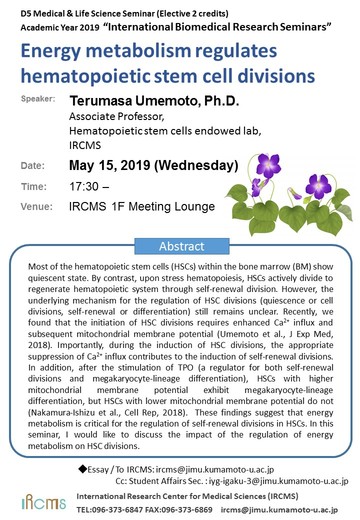- HOME
- News & Events
- [May15]D5 Medical & Life Science Seminar - Dr. Terumasa Umemoto
News & Events
[May15]D5 Medical & Life Science Seminar - Dr. Terumasa Umemoto
April 23 2019
The "D5 Medical & Life Science Seminar" course will be offered by International Research Center for Medical Sciences (IRCMS). It will run from April 2019 to March 2020, with lectures given by scientists who are affiliated with IRCMS or in collaboration with researchers at IRCMS. The lectures will be given once a month, in English, and by leading scientists in the relevant research field. Students will be taught: 1) how normal physiological functions are maintained in the human body; 2) how abnormalities in these systems (e.g., cancer) are studied using experimental models; 3) cutting-edge technologies (including single cell level imaging and omics analysis) used for mechanistic understanding of these abnormalities; 4) efforts and progresses in finding cure for human diseases associated with these abnormalities; and 5) importance of understanding disease mechanisms using cross-disciplinary approaches.
Date : May 15, 2019 (Wed)
Time : 17:30 -
Venue : IRCMS 1F Meeting Lounge
Speaker : Terumasa Umemoto, Ph.D.
Associate Professor, Hematopoietic stem cells endowed lab
IRCMS
Title :Energy metabolism regulates hematopoietic stem cell divisions
Abstract :
Most of the hematopoietic stem cells (HSCs) within the bone marrow (BM) show quiescent state. By contrast, upon stress hematopoiesis, HSCs actively divide to regenerate hematopoietic system through self-renewal division. However, the underlying mechanism for the regulation of HSC divisions (quiescence or cell divisions, self-renewal or differentiation) still remains unclear. Recently, we found that the initiation of HSC divisions requires enhanced Ca2+ influx and subsequent mitochondrial membrane potential (Umemoto et al., J Exp Med, 2018). Importantly, during the induction of HSC divisions, the appropriate suppression of Ca2+ influx contributes to the induction of self-renewal divisions. In addition, after the stimulation of TPO (a regulator for both self-renewal divisions and megakaryocyte-lineage differentiation), HSCs with higher mitochondrial membrane potential exhibit megakaryocyte-lineage differentiation, but HSCs with lower mitochondrial membrane potential do not (Nakamura-Ishizu et al., Cell Rep, 2018). These findings suggest that energy metabolism is critical for the regulation of self-renewal divisions in HSCs. In this seminar, I would like to discuss the impact of the regulation of energy metabolism on HSC divisions.

